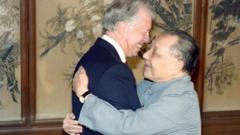In January 1979, a pivotal moment in history occurred as then US President Jimmy Carter welcomed Deng Xiaoping, the first leader of Communist China to visit the United States, to Washington. This encounter marked the beginning of a new diplomatic era that would profoundly reshape the global landscape, laying the groundwork for China's economic rise and its future rivalry with the US.
Carter's decision to establish formal ties with China stands out as one of the most significant legacies of his presidency, which spanned a turbulent term. He often linked his commitment to China to a sense of destiny, a sentiment reflected in the close and lasting relationships he built with the Chinese people and their leaders. Even after leaving office, Carter worked to maintain connections with China, earning the affection of the populace and respect from Chinese officials. The Chinese government recognized Carter’s efforts, describing him as a “driving force” behind the 1979 diplomatic agreement.
The roots of Carter's engagement with China can be traced back to his experiences in the late 1940s, when he served as a naval officer during the turbulent civil war in China. Over the following decades, it was under the guidance of earlier leaders like Richard Nixon and Henry Kissinger that connections started to grow between the US and China. However, it was Carter who deepened this engagement through meticulous negotiations and a personal rapport with Deng Xiaoping. Their mutual understanding and trust were pivotal to advancing a partnership that would benefit both nations.
The formal recognition of diplomatic relations in December 1978 led to the adoption of the 'One China' policy, a cornerstone of US foreign relations that remains relevant today. However, this shift resulted in backlash, especially from Taiwan, complicating Carter's foreign policy legacy. Congress's subsequent attempts to ensure support for Taiwan reflected ongoing tensions in US-China relations.
Carter’s unique friendship with Deng was characterized by mutual respect and candor. They were able to navigate through the complexities of their nations' histories and political landscapes to foster cooperation. Deng’s charismatic charm and Carter’s down-to-earth demeanor created a collegial atmosphere, as showcased during Deng’s US visit, where his participation in local culture garnered media attention.
Despite their successes, Carter’s later relationship with China experienced strains, particularly under Xi Jinping's leadership. As US-China relations soured in recent years, Carter critiqued the growing distrust between the two countries and the potential for a “modern Cold War.”
Nevertheless, historians acknowledge that Carter’s diplomacy not only contributed to an unprecedented era of peace and economic growth in East Asia but also resulted in profound changes within China itself, fostering advancements in local democracy and economic development.
Looking back, Carter viewed his connection with China as foundational for future peace. He remarked, “The cause of peace remains just as important,” urging future leaders to prioritize collaboration for the betterment of both nations and the global community. His legacy continues to inspire debates on the complexities of US-China relations and the potential paths for future cooperation amidst rising tensions.
Carter's decision to establish formal ties with China stands out as one of the most significant legacies of his presidency, which spanned a turbulent term. He often linked his commitment to China to a sense of destiny, a sentiment reflected in the close and lasting relationships he built with the Chinese people and their leaders. Even after leaving office, Carter worked to maintain connections with China, earning the affection of the populace and respect from Chinese officials. The Chinese government recognized Carter’s efforts, describing him as a “driving force” behind the 1979 diplomatic agreement.
The roots of Carter's engagement with China can be traced back to his experiences in the late 1940s, when he served as a naval officer during the turbulent civil war in China. Over the following decades, it was under the guidance of earlier leaders like Richard Nixon and Henry Kissinger that connections started to grow between the US and China. However, it was Carter who deepened this engagement through meticulous negotiations and a personal rapport with Deng Xiaoping. Their mutual understanding and trust were pivotal to advancing a partnership that would benefit both nations.
The formal recognition of diplomatic relations in December 1978 led to the adoption of the 'One China' policy, a cornerstone of US foreign relations that remains relevant today. However, this shift resulted in backlash, especially from Taiwan, complicating Carter's foreign policy legacy. Congress's subsequent attempts to ensure support for Taiwan reflected ongoing tensions in US-China relations.
Carter’s unique friendship with Deng was characterized by mutual respect and candor. They were able to navigate through the complexities of their nations' histories and political landscapes to foster cooperation. Deng’s charismatic charm and Carter’s down-to-earth demeanor created a collegial atmosphere, as showcased during Deng’s US visit, where his participation in local culture garnered media attention.
Despite their successes, Carter’s later relationship with China experienced strains, particularly under Xi Jinping's leadership. As US-China relations soured in recent years, Carter critiqued the growing distrust between the two countries and the potential for a “modern Cold War.”
Nevertheless, historians acknowledge that Carter’s diplomacy not only contributed to an unprecedented era of peace and economic growth in East Asia but also resulted in profound changes within China itself, fostering advancements in local democracy and economic development.
Looking back, Carter viewed his connection with China as foundational for future peace. He remarked, “The cause of peace remains just as important,” urging future leaders to prioritize collaboration for the betterment of both nations and the global community. His legacy continues to inspire debates on the complexities of US-China relations and the potential paths for future cooperation amidst rising tensions.


















